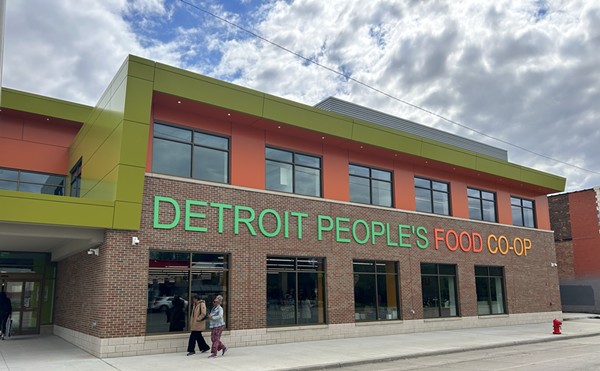Detroit is home to more community gardens than any other city in the United States. With more than 1,200 gardens, we have more per square mile — nine-plus — and more per capita than our closest competitors, according to numbers generated by the Greening of Detroit's Gardening Resource Program. Our closest competitors, Cleveland, New York City and a few others, have at best four per square mile, and our per capita numbers are twice the closest competition.
That burgeoning production is one step in an urban agriculture movement that is about more than just growing and selling produce. Last weekend's Detroit Food Summit, Powering Up the Local Food System, held at the Focus: HOPE Conference Center, brought together about 150 local foodies to discuss and plan a potential food system driven by local enterprises and entrepreneurs.
Community gardens are gardens worked by neighborhood residents or church members or some kind of group that decides to garden together and share whatever they reap. The Feedem Freedom Growers, Georgia Street Garden and Pingree's Potato Patch are examples of these.
Often these gardens are on vacant lots that community members have taken over to fight blight, and the supply of fresh fruits and vegetables is an extra benefit. Some gardens are started specifically for the food. Other gardens are backyard family affairs. And there are market gardens created specifically to provide local produce markets or for restaurants. A couple of gardeners make their living providing niche products. Numerous others pull in $3,000 to $5,000 in profits each year. Not enough to live on, but enough to collectively impact the food supply.
"The food system is a rich, complex beast that needs attending to," said Phil Jones, chair of the Detroit Food Policy Council, which put on the summit.
It's a beast that local food activists intend to tame by tying together food processing and distribution, culinary arts careers, restaurants, institutions such as hospitals and schools, markets, consumers and, well, farming and farming equipment. The food system encompasses everything that happens to food from growing to eating and even composting the remains.
"It's a big circle," said Ashley Atkinson of the Gardening Resource Center. "If we all help each other out, we all rise together."
One of the weekend's sessions, Planting Seeds for a Good Business Ecosystem, highlighted ways for entrepreneurs to balance the profit motive with concern for community and the environment. Jess Daniel of Foodlab Detroit and Tawyna Clark of the soon-to-open Batata Shop focused on the relationships that a new business owner has to develop — a system-oriented approach, if you will. Using Clark's development of the Batata (a waffle or pancake made with sweet potatoes) from a family recipe to a commercial product, they showed how the process includes a series of relationships from a flour supplier to computer technicians to property owners to packagers to customers to waste processing and myriad others. In a discussion of working with a flour supplier, they pointed out the impact that each has on the other. The Batata Shop's needs might help the supplier develop a whole new line of products, or open them up to a new market.
Urban Agriculture Policy in the City of Detroit focused on another key area. In Detroit it's not exactly legal to farm, but it's not exactly illegal either. One of the questions here is: At what point do you designate something a farm as opposed to just a big garden? If an industry built around agriculture is going to be a major player in the city, it needs to be regulated in a way that works for all residents. Another question is zoning: Not everybody wants a farm next door.
Kathryn Lynch Underwood, from the City Planning Commission and chair of the Urban Agriculture Work Group (an entirely different kind of UAW for these parts), provided an overview of proposed land use policy. The proposals discussed included things like what animals, if any, should be allowed and under what conditions? The prevailing sentiment is to allow chickens (but no roosters), rabbits and bees, but goats (there are some out there already) and creatures such as pigs and cows would not be permitted. Of course, that leads to questions of how many would be allowed and how far from the neighbors they would have to be? And what kind of facilities do you keep them in? I know a woman who lives on farmland near Fowlerville who lets her chickens wander through the house. I don't think that's going to fly in Detroit.
The UAW's proposed definition of a garden is contiguous lots comprising as much as one acre; that would be a little more than 12 standard city lots of 30 feet by 115 feet each. A farm would be more than an acre of contiguous or noncontiguous lots. That's a lot of space for the average gardener, but not much for a commercial operation.
Other issues include defining a farm stand and deciding where growers can sell produce, not to mention rainwater catchment systems, composting operations, greenhouses (which seem to be cropping up all over town), property maintenance, noise issues, pesticide use and more. Underwood emphasized that she was discussing pilot policy, "We will change things as we learn," she said.
This is something of a brave new world for Detroiters, although agriculture was big around here before the auto industry took over. A friend's mother used to tell me about a family farm that was located near McNichols Road and Pennington Street as recently as the 1940s. On the south side of McNichols there are plenty of vacant lots that could be farmed today.
The monolithic auto industry and Detroit's dependence on it is over. Yes, the auto industry is still here and healthier than it was a few years ago. But most of the jobs that left town for cheaper labor markets aren't coming back. At its peak in the 1940s, the Ford Rouge Plant employed about 100,000 workers. With the technology now available, they do the job with a very few thousand.
We need diversity and homegrown businesses to build another economy. And the local food system as discussed at last weekend's conference has the potential to be one piece of that new economy. That's why Michigan State University has proposed investing as much as $100 million into an urban agriculture research site in Detroit, and Hantz Farms, a subsidiary of a financial services company, is looking to locate here.
Food is huge. The bottom line is everybody needs to eat. Every one of Detroit's 714,000 residents needs to eat every day — hopefully more than once. A recent salon.com story about the Whole Foods store coming to town reported that Detroiters spend $200 million each year at grocery stores outside the city. That doesn't include restaurant sales. It would be great if most of that money could be captured and recirculated in Detroit.
Encompassing sustenance, economics and health, the food movement has, so far, grown organically at the grassroots level. It's getting bigger and now demands attention from all of us. Think about that as you sit down for dinner.






